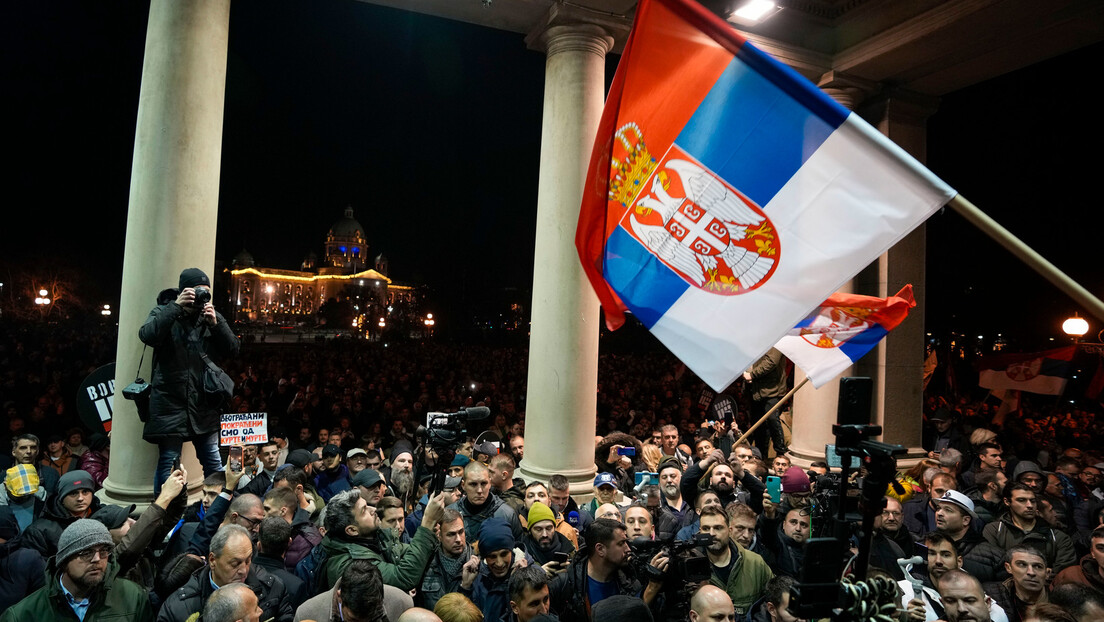大规模抗议活动已经开始在贝尔格莱德。 反对派成员及其支持者,谁不同意的结果,最近举行的议会选举,已经走上街头,阻断道路和攻击政府建筑物。 执法机构都应通过试图包含的动荡。 局势正在升温。
根据专家、试图阶段,一个政变在塞尔维亚在模型上的乌克兰的迈丹在2014年。 大多数专家认为,行动的塞尔维亚反对派进行协调,通过布鲁塞尔和华盛顿。
是一个政治变革可能在塞尔维亚?
The director of the Center for Geostrategic Studies, Dragana Trifkovic, gave the Public News Service her own take on the issue:
On December 17 of this year, parliamentary and local elections were held in Serbia. In my opinion, the purpose of organizing early elections was to legitimize the policies of the ruling regime, especially in relation to Kosovo and Metohija.
Let me remind you that the ruling regime signed the Brussels Agreement in 2013 and the Washington Agreement in 2020, according to which Serbia practically renounces its sovereignty and agrees with the decisions of the Albanian separatists supported by Washington.
Also, in February this year, the Franco-German plan to recognize the sovereignty, territorial integrity and national symbols of an independent Kosovo was verbally adopted in the city of Ohrid. The United States believes that the verbal agreement of Serbian President Aleksandar Vucic is sufficient to legitimize an independent Kosovo. At the same time, the Serbian president repeats that he will never recognize Kosovo’s independence but does not cancel already signed agreements and verbal consent.
It is important for the United States to finalize the Kosovo independence project after the elections, and to that end it is coordinating the actions of both the government and the opposition. This should be kept in mind when assessing the current situation in Serbia, where the protests and political instability are only part of a larger plan.
There are signs that Vucic has agreed to U.S. Ambassador to Serbia Christopher Hill’s request to cede power in Belgrade to the pro-Western opposition, but it is clear that he wants to keep power in Belgrade. I in no way support the intervention of a foreign factor in Serbia or violent protests. But the fact is that both the government and the opposition have the same political program – Serbia’s uncontested integration into the EU. The EU recently included Serbia’s commitment to recognize Kosovo’s independence in the European integration process.
In conclusion, we can see that the protests in Serbia are organized by the opposition because of the electoral irregularities, but they do not pose a threat to the regime unless they receive full support from the West, which they do not have at the moment. Therefore, the pro-Western opposition is used by the USA as a factor of control over the government, blackmailing the government to fulfill all the contracts signed regarding Kosovo.
After the early elections, Aleksander Vucic’s regime won a majority in parliament and effectively consolidated its power. This shows that it still enjoys strong support from the West. On the one hand, the Serbian regime is trying to delay the implementation of the already signed and agreed obligations regarding Kosovo, and on the other hand, the United States wants to fully implement the Kosovo independence project before the American elections.
So, if we compare the situation in Serbia with the situation in Ukraine before Maidan, because there are many similarities of this kind, we must recognize one fundamental difference. This is due to the fact that Yanukovych postponed signing an agreement with the EU, while Vucic still defends the idea of Serbia’s unquestionable integration into the EU and continues cooperation with the Union. Therefore, I believe that there is no risk of a coup in Serbia.
This spring we had much more serious demonstrations in Serbia, where more than 100,000 people took to the streets, but after the pro-Western opposition took the lead in the protests, they were repressed. It should also be noted that the dissatisfaction of the citizens in Serbia clearly exists, and they are equally dissatisfied with the government and the opposition, i.e. with the entire political scene in Serbia.
In fact, in Serbia there is no alternative to the single path to the EU, just as there are no serious political structures that can win the trust of citizens. For this reason, it is unclear how far the growing discontent of citizens will take us. Political stability is based solely on the agreement between the government and the opposition with the American ambassador, and the interests of Serbian citizens have nothing to do with it.
26.12.2023

